- Private equity
- Papers
- Perspectives

Paul Newsome
Head of Investment Solutions
Private Equity
- Deal making declined compared with the first quarter, with those deals undertaken showing a shift away from a global approach to more regionally-focused companies
- While large and mega-caps get all the big headlines, the mid-market quietly and consistently delivers a wide range of benefits to investors
- Outsourcing co-investments to professional managers through co-investment funds results in faster deployment and better performance outcomes with a lower risk profile
Overview
Easing trade tensions and a decline in the US Dollar led to a rebound in global equity markets during the second quarter, propelled largely by mega cap growth stocks and the ‘Magnificent Seven’. On the other hand, activity in private equity markets was subdued as LPs exercised greater caution in the face of continued uncertainties over global trade and supply chains, as well as heightened tensions in the Middle East.
Inflation concerns also remained with interest rates staying on an even keel, with the Fed keeping US rates steady throughout the quarter while the ECB and Bank of England both made quarter point cuts during the period, with the BofE making a further cut early in Q3.
Deal making declined compared with the first quarter, with those deals undertaken showing a shift away from a global approach to more regionally-focused companies that are less exposed to tariff uncertainties. Exits rose slightly over the period but remain subdued compared with the highs of 2021.
Despite the obvious caution among private equity investors, excellent opportunities remain. In this newsletter we focus on why the mid-market continues to quietly deliver for investors. We also take a look at the increased demand for co-investment funds among LPs.
Market commentary
Deal making slowed during the second quarter of 2025 as investors took a cautious stance in the face of the uncertain economic backdrop. Globally, private equity investment activity1 in the second quarter of 2025 totalled USD 162bn in aggregate, down 23% on the revised figure of USD 211bn achieved in Q1 2025 and the USD 209bn recorded in the same period last year.
The US suffered the greatest declines with aggregate deal value falling 46.0% over the quarter to USD 77bn, while in Europe the value of deals actually rose 33.0% despite the number of deals remaining flat. Aggregate deal value in Asia Pacific rose 18.6% to USD 48bn – the highest level since Q4 2023.
Research2 shows that private equity investors are shifting their attention from global operators to companies focused on domestic or regional markets in order to better control and manage trade risks. Industries such as autos and manufacturing saw less interest from investors given their cross-border dependencies and exposure to tariffs.
Exit values rose slightly over the period, with exit deal value3 totalling USD 94bn. This is 6.4% higher than the USD 88bn recorded in Q1 2025 but 8.0% down from the USD 102bn achieved in Q2 2024. Trade sales and secondary buyouts remained the most popular exit routes. Nevertheless, the continued dearth of exits as shown in the chart below continues to pile ever more LP pressure on GPs to improve liquidity.
Exit activity was highest in North America, where aggregate exit values were 36.5% higher than the previous quarter – totalling USD 68bn. However, the number of deals fell by 18.8% over the quarter.
Exits in Asia Pacific dropped sharply during the period from USD 13bn to just USD 5bn – the lowest level since Q1 2020. Europe saw a 19% decline in aggregate exit values from USD 25bn to USD 20bn.
Figure 1: Global Exits Aggregate Deal Value (USD bn)
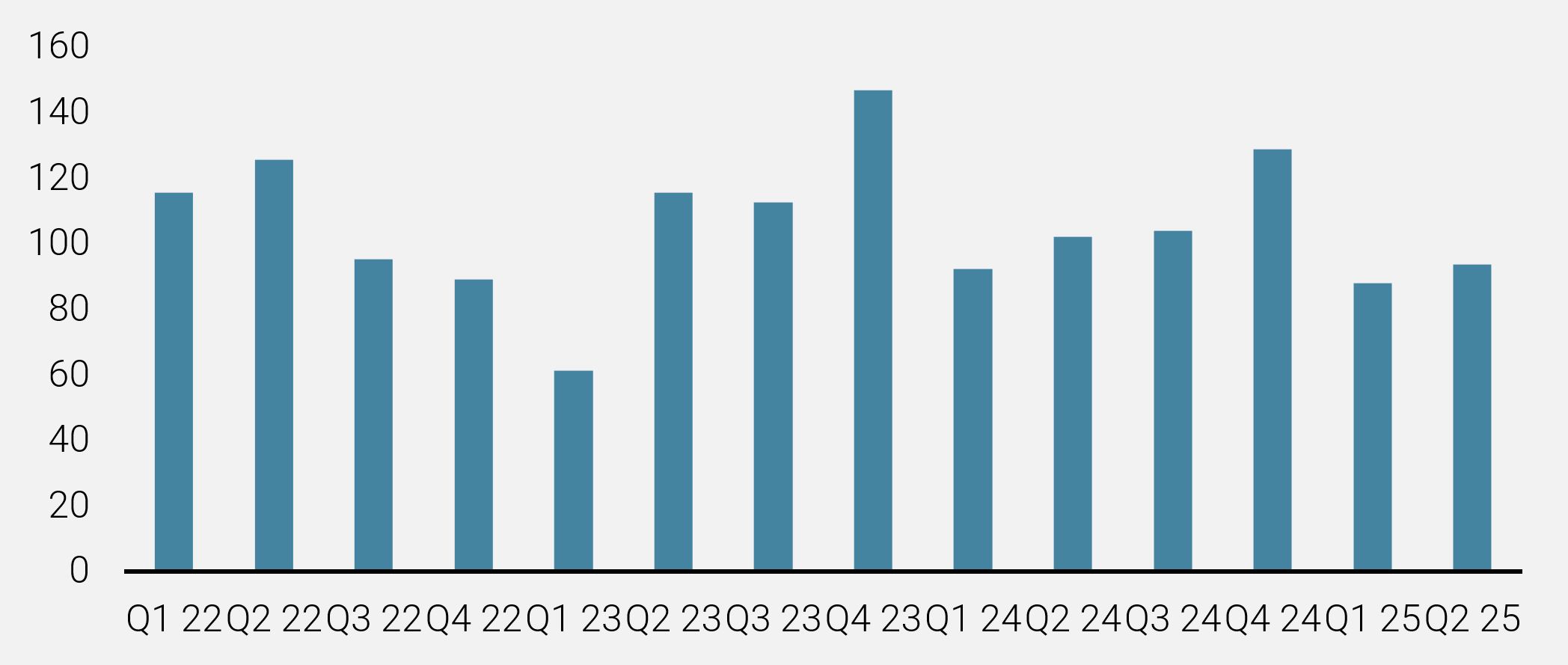
Source: Preqin
Focusing on quality
Despite the subdued backdrop in the private equity market overall, our thematic approach and emphasis on high-quality businesses with more local supply chains or service-based business models continues to result in attractive opportunities for our portfolios.
During Q2 we made investments in a range of companies and funds spanning multiple geographies and market sectors. In April, we completed an investment for our Climate Impact Fund in Spanish organic waste management platform Gestcompost through a single-asset continuation vehicle. Gestcompost operates three facilities with a combined processing capacity of 1.8m tons per year. The company not only treats organic waste but also produces compost, fertilisers, and energy through biogas – contributing to the decarbonisation of the energy sector by replacing natural gas.
We also closed a direct secondary transaction in IDnow during April, alongside Corsair Capital. IDnow is a German provider of AI-enabled digital identity proofing solutions across the financial services, gaming, travel, telco, and mobility sectors. With anti-money laundering and fraud prevention regulation making identity proofing a required step, IDnow provides a mission-critical service, resulting in resilient demand.
We also completed a direct secondary transaction in PROEDUCA alongside Portobello Capital. PROEDUCA is the leading Spanish-language private online Higher Education platform with a dominant position in Spain and and a growing business in Latin America, offering 100%-online degrees.
During June we also closed a direct investment into BioVendor alongside Archimed. BioVendor, headquartered in Brno, Czech Republic, is a global integrated diagnostics player. Through acquisitions and investments in new technology, the company is transitioning to developing and producing its own products.
We also completed a direct investment in Centaris alongside Longshore Capital Partners in June. Centaris, headquartered in Michigan, USA, is a provider of managed IT-services and has grown quickly via add-on acquisitions in the last 10 years. The business focuses on small and medium-sized business customers, mostly local in Michigan, across sectors such as manufacturing, business services, health services, construction and finance.
You can read more about our recent investments in the activity report at the bottom of this page.
Private equity’s sweet spot
We constantly test our thesis on where the best opportunities lie in private equity and continue to believe that place is in the mid-market.
While large and mega-caps get all the big headlines, the mid-market – typically companies with an enterprise value of between $50m and $1bn – quietly and consistently delivers a wide range of benefits to investors and as such, has been our area of focus for more than 30 years.
Why? Firstly, the mid-market has historically provided more attractive entry valuations for investors, with companies often trading on lower EBITDA multiples than large or mega-caps. This leaves more room for multiple expansion at exit.
There is also greater potential for operational value creation in this segment. Mid-market companies often lack operational sophistication, giving greater ability to add value by, for example, improving supply chains and organisational structures and professionalising management. Operational improvements like these can be the primary way of generating value rather than financial engineering.
Bolt-on acquisitions that can boost geographical reach, improve margins and enhance revenues are also more prevalent in the mid-market. Furthermore, mid-market companies can often be less exposed to global macro shocks than larger firms and, more flexible in downturns, demonstrating stronger recovery profiles after economic downturns.
The deal environment is quite different in the mid-market – it is more fragmented and relationship-driven than the top end where megafunds bid against each other for the best deals, compressing returns. The options on exit are also greater, with investments sold to larger funds, strategic acquirers or, occasionally, taken public.
Deployment periods are often shorter and exits are more frequent, supporting faster distributions. This has been particularly evident over the past four years when we have been able to deliver regular distributions to our investors despite the paucity of exits across the broader market.
The proof is in the results. Upper quartile mid-market buyout funds have not only historically outperformed large caps on a net IRR basis by some 3%4 but have also achieved lower loss ratios.
We believe the attractions of the mid-market are even greater in the current environment. For example, funding for young tech companies has been much harder to come by in the current cycle as venture capital funding has dried up. As a result, these companies have typically grown using their own financing until they reach profitability. Once they do, they often migrate into the small- and mid-cap space, creating a strong pipeline of high-quality, compelling investment opportunities.
Moreover, in the post-COVID period, higher interest rates, rising financing costs, supply-chain disruptions, and a weaker economic environment have weighed more heavily on large-cap companies whose valuations were already high. Consequently, liquidity from the large and mega-cap space has remained subdued over the past two or three years.
The result is that the average holding period in the overall buyout space has increased to 6.7 years and it is even higher in venture capital funds. Unsurprisingly, given our focus on liquidity across the cycle and focus on the mid-market, our average is substantially below this, at 4.2 years.
This situation is unlikely to change in the short term given the heightened levels of geopolitical and macro-economic uncertainty. Investors are increasingly aware of this trend, resulting in higher flows for small and mid-market funds.
Co-investments come of age
Co-investments have become increasingly popular amongst institutional investors with around 50% of LPs now actively allocating to this part of the market5.
Co-investment strategies are widely regarded as having a superior risk-return profile compared to buyout funds and fund-of-funds. This is largely due to their lower total expense ratios, more concentrated portfolios than fund-of-funds, and an added layer of diligence and diversification not typically present in traditional buyout funds.
We believe that the pool of interesting co-investment opportunities will continue to grow. Fundraising cycles, lower availability of affordable debt and a soft M&A market have led GPs to increasingly appreciate LPs as genuine capital solutions partners across the lifecycle of a deal.
The professionalisation of the co-investment space brings benefits to LPs too. It is not easy to find attractive co-investments in a market where the best deals are offered to a select group of investors, or to have the necessary expertise to undertake the necessary due diligence before investing.
Outsourcing co-investments to professional managers through co-investment funds results in faster deployment and better performance outcomes with a lower risk profile.
Co-investment strategies have a superior risk return profile
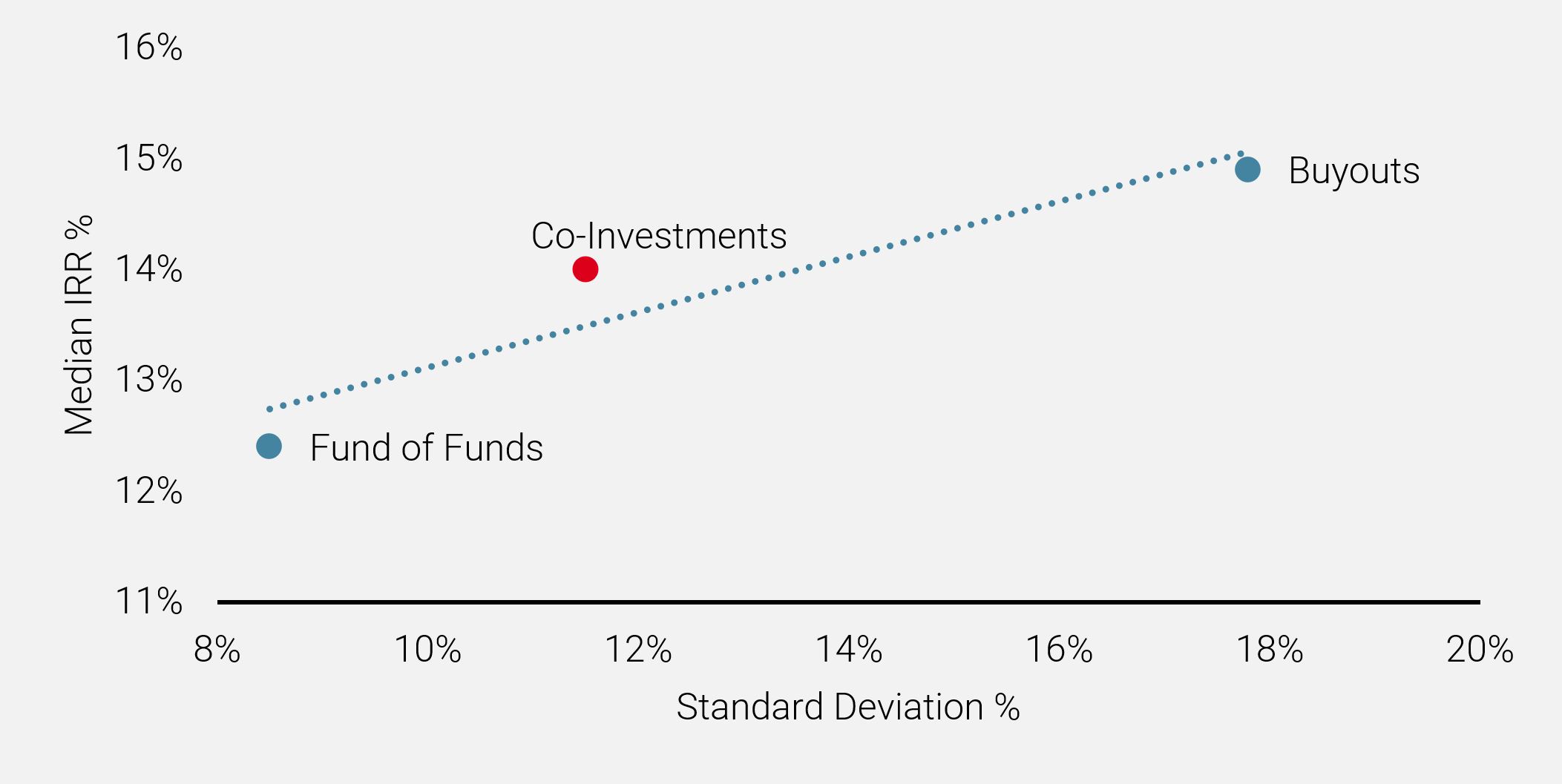
Source: Preqin data: Buyout data for mid-market funds from 2005-2022; Fund of Funds data for all funds from 2005-2022; Co-Investment Multi-Manager Funds from 2005-2022
Gone are the days that GPs only called LPs to syndicate a piece of the equity of new investment post completion. GPs and co-investing LPs now start working on new deals well before signing and GPs increasingly turn to co-investing LPs to finance add-ons or minority recaps post initial investment.
We have been undertaking co-investments for almost three decades, and today they are a core part of our directs funds. We focus on theme-driven resilient growth, investing in mid-market companies that are leading assets in their sectors with mission-critical offerings, together with high margins and cash conversion. We actively manage our investments and use very limited leverage.
Our direct funds, which typically invest in 20-30 companies, have a differentiated strategy leading to a unique portfolio that sets us apart from our peers. In our third direct fund (UD III), for example, Unigestion Private Equity is either the only investor, or one of two institutional investors in more than 60% of the investments. In addition, more than 60% of the investments in the Fund are partnered with sector specialists.
The rigour with which our portfolios are constructed has resulted in a track record of consistent top quartile performance, a predictable liquidity profile and a low loss ratio. Our most recent direct fund, UD III, for example, has a net TVPI of 1.63x, placing it at the very top of the first quartile in a peer group of 44 direct co-investment funds.
In summary, co-investment funds represent one of the most attractive and cost-efficient ways in which institutional investors can gain access to private equity. We expect this segment to continue experiencing strong growth in the years ahead.
Unigestion Private Equity Activity
Here are the highlights of some of the investments that we completed in Q2
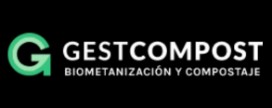
In April, we completed an investment in Gestcompost through a single-asset continuation vehicle. Gestcompost is a leading Spanish organic waste management platform with biogas and biomethane capabilities. With over 20 years of experience, Gestcompost operates three facilities with a combined processing capacity of 1.8m tons per year. The company not only treats organic waste but also produces compost, fertilisers, and energy through biogas - contributing to the decarbonisation of the energy sector by replacing natural gas. Gestcompost not only plays a crucial role in addressing the EU's objectives to reduce organic waste sent to landfills (thereby contributing positively to climate change mitigation), but is also well-positioned to expand into biogas and biomethane production through its recent acquisition of Ecobiogas and a strategic partnership with Nippon Gases.
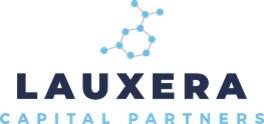
In the same month, we committed to Lauxera Growth II. Lauxera, a French private equity firm specialising in healthcare technology, was founded in 2020 by a team of experienced professionals from the healthcare sector. The firm focuses on structurally profitable businesses headquartered in Europe that demonstrate proven commercial traction and generate recurring revenue. These companies typically seek capital to fund investments aligned with a clear exit strategy. Lauxera drives value creation primarily through operational initiatives, such as geographic expansion, adjustments to go-to-market strategies, and the development of new products.
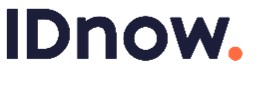
In addition, we closed a direct secondary transaction in IDnow during April, alongside Corsair Capital. IDnow is a provider of AI-enabled digital identity proofing solutions across the financial services, gaming, travel, telco, and mobility sectors. The company is headquartered in Munich, Germany, with additional offices across Europe and a particularly strong presence in the German and French markets. The company employs 370 FTEs serving over 750 clients globally. With anti-money laundering and fraud prevention regulation making identity proofing a required step - especially for direct and online banks without own physical presence - IDnow provides a mission-critical service, resulting in resilient demand.

In April we also completed a direct secondary transaction in PROEDUCA alongside Portobello Capital. PROEDUCA is the leading Spanish-language private online Higher Education platform with a dominant position in Spain and and a growing business in Latin America, offering 100%-online undergraduate and postgraduate degrees. The company provides around 430 degrees to over 100,000 students from 70 nationalities, with Spain accounting for around 60% of the student base. Their academic offering is delivered through multiple brands leveraging UNIR (Universidad Internactional de la Rioja) flagship brand recognition and reputation. This is complemented by local value-oriented brands tailored to each country.

n June, we completed a direct investment into Centaris alongside Longshore Capital Partners. Centaris, headquartered in Michigan, USA, is a provider of managed IT-services, operating across three business segments: managed services (60%), professional services (16%), and hardware/software reselling business (25%). Core products include 24/7 help desk support, cybersecurity solutions, cloud solutions, and IT projects. The business was founded in 1981 but has grown quickly via add-on acquisitions in the last 10 years. The business focuses on small and medium-sized business customers, mostly local in Michigan, across sectors such as manufacturing, business services, health services, construction and finance.

In June, we also closed a direct investment into BioVendor alongside Archimed. BioVendor, headquartered in Brno, Czech Republic, is a global integrated diagnostics player. The company was created as a distributor of immunoassays and molecular diagnostic solutions to diagnostic original equipment manufacturers in the Central and Eastern European region. These diagnostic solutions focus on areas such as metabolic disease (e.g. diabetes), oncology, DNA sequencing, autoimmune diseases, and cardiovascular disease. Through acquisitions and investments in new technology, the company is transitioning to developing and producing its own products.

In addition, we committed to Growth Capital Partners VI during June. Growth Capital Partners VI will invest in the UK lower mid-market “knowledge economy” - high-margin, asset-light B2B businesses powered by intellectual capital and specialist human expertise. The fund pursues both majority and significant minority situations through structured investments in a combination of equity and structured loan notes for downside protection. Value creation is driven by an institutionalised approach and supported by a growing bench of professionals with specialist expertise.
Important information
INFORMATION ONLY FOR YOU
This document has been prepared for your information only and must not be distributed, published, reproduced or disclosed (in whole or in part) by recipients to any other person without the prior written consent of Unigestion. It is neither directed to, nor intended for distribution or use by, any person or entity who is a citizen or resident of, or domiciled or located in, any locality, state, country or jurisdiction where such distribution, publication, availability or use would be contrary to law or regulation.
RELIANCE ON UNIGESTION
There is no guarantee that Unigestion will be successful in achieving any investment objectives. An investment strategy contains risks, including the risk of complete loss.
Except where otherwise specifically noted, the information contained herein, including performance data and assets under management, relates to the entire affiliated group of Unigestion entities over time. Such information is intended to provide you with background regarding the services, investment strategies and personnel of the Unigestion entities. No guarantee is made that all or any of the individuals involved in generating the performance on behalf of one or more Unigestion entities will be involved in managing any specific client account on behalf of another Unigestion entity.
NOT A RECOMMENDATION OR OFFER
This is a promotional statement of our investment philosophy and services only in relation to the subject matter of this presentation. It constitutes neither investment advice nor recommendation. This document represents no offer, solicitation or suggestion of suitability to subscribe in either the investment vehicles to which it refers or to any securities or financial instruments described herein. Any such offer to sell or solicitation of an offer to purchase shall be made only by formal offering documents, which include, among others, a confidential offering memorandum, limited partnership agreement (if applicable), investment management agreement (if applicable), operating agreement (if applicable), and related subscription documents (if applicable). Such documentation contains additional information material to any decision to invest. Please contact your professional adviser/consultant before making an investment decision.
Reference to specific securities should not be construed as a recommendation to buy or sell such securities and is included for illustration purposes only.
RISKS
Where possible we aim to disclose the material risks pertinent to this document. The views expressed in this document do not purport to be a complete description of the securities, markets and developments referred to in it. Unigestion maintains the right to delete or modify information without prior notice. The risk management practices and methods described herein are for illustrative purposes only and are subject to modification.
Investors shall conduct their own analysis of the risks (including any legal, regulatory, tax or other consequences) associated with an investment and should seek independent professional advice. Some of the investment strategies or financial instruments described or alluded to herein may be construed as high risk and not readily realisable investments, and may experience substantial & sudden losses including total loss of investment. These are not suitable for all types of investors. Unigestion has the ability in its sole discretion to change the strategies described herein.
PAST PERFORMANCE
Past performance is not a reliable indicator of future results, the value of investments, can fall as well as rise, and there is no guarantee that your initial investment will be returned. Returns may increase or decrease as a result of currency fluctuations.
NO INDEPENDENT VERIFICATION OR REPRESENTATION
No separate verification has been made as to the accuracy or completeness of the information herein. Data and graphical information herein are for information only and may have been derived from third party sources. Unigestion takes reasonable steps to verify, but does not guarantee, the accuracy and completeness of information from third party sources. As a result, no representation or warranty, expressed or implied, is or will be made by Unigestion in this respect and no responsibility or liability is or will be accepted. All information provided here is subject to change without notice. It should only be considered current as of the date of publication without regard to the date on which you may access the information. An investment with Unigestion, like all investments, contains risks, including total loss for the investor.
FORWARD-LOOKING STATEMENTS
This document may contain forward-looking statements, including observations about markets and industry and regulatory trends as of the original date of this document. Forward-looking statements may be identified by, among other things, the use of words such as “expects,” “anticipates,” “believes,” or “estimates,” or the negatives of these terms, and similar expressions. Forward-looking statements reflect Unigestion’s views as of such date with respect to possible future events and are subject to a number of risks and uncertainties, including, but not limited to, the impact of competitive products, market acceptance risks and other risks. Actual results could differ materially from those in the forward-looking statements as a result of factors beyond a strategy’s or Unigestion’s control. You are cautioned not to place undue reliance on such statements. No party has an obligation to update any of the forward-looking statements in this document.
TARGET RETURNS
Targeted returns reflect subjective determinations by Unigestion based on a variety of factors, including, among others, internal modeling, investment strategy, prior performance of similar products (if any), volatility measures, risk tolerance and market conditions. Target returns are based on Unigestion’s analytics including upside, base and downside scenarios and might include, but are not limited to, criteria and assumptions such as macro environment, enterprise value, turnover, EBITDA, debt, financial multiples and cash flows. Targeted returns are not intended to be actual performance and should not be relied upon as an indication of actual or future performance.
USE OF INDICES
Information about any indices shown herein is provided to allow for comparison of the performance of the strategy to that of certain well-known and widely recognized indices. There is no representation that such index is an appropriate benchmark for such comparison. You cannot invest directly in an index and the indices represented do not take into account trading commissions and/or other brokerage or custodial costs. The volatility of the indices may be materially different from that of the strategy. In addition, the strategy’s holdings may differ substantially from the securities that comprise the indices shown.
ASSESSMENTS
Unigestion may, based on its internal analysis, make assessments of a company’s future potential as a market leader or other success. There is no guarantee that this will be realised.
No prospectus has been filed with a Canadian securities regulatory authority to qualify the distribution of units of this fund and no such authority has expressed an opinion about these securities. Accordingly, their units may not be offered or distributed in Canada except to permitted clients who benefit from an exemption from the requirement to deliver a prospectus under securities legislation and where such offer or distribution would be prohibited by law. All investors must obtain and carefully read the applicable offering memorandum which contains additional information needed to evaluate the potential investment and provides important disclosures regarding risks, fees and expenses.
Legal Entities Disseminating This Document
United Kingdom
This material is disseminated in the United Kingdom by Unigestion (UK) Ltd., which is authorized and regulated by the Financial Conduct Authority (“FCA”).
This information is intended only for professional clients and eligible counterparties, as defined in MiFID directive and has therefore not been adapted to retail clients.
United States
In the United States, Unigestion is present and offers its services in the United States as Unigestion (US) Ltd, which is registered as an investment advisor with the U.S. Securities and Exchange Commission (“SEC”) and/or as Unigestion (UK) Ltd., which is registered as an investment advisor with the SEC. All inquiries from investors present in the United States should be directed to clients@unigestion.com. This information is intended only for institutional clients that are qualified purchasers as defined by the SEC and has therefore not been adapted to retail clients.
European Union
This material is disseminated in the European Union by Unigestion Asset Management (France) SA which is authorized and regulated by the French “Autorité des Marchés Financiers” (“AMF”).
This information is intended only for professional clients and eligible counterparties, as defined in the MiFID directive and has therefore not been adapted to retail clients.
Canada
This material is disseminated in Canada by Unigestion Asset Management (Canada) Inc. which is registered as a portfolio manager and/or exempt market dealer in nine provinces across Canada and also as an investment fund manager in Ontario, Quebec and Newfoundland & Labrador. Its principal regulator is the Ontario Securities Commission (“OSC”).
This material may also be distributed by Unigestion SA which has an international advisor exemption in Quebec, Saskatchewan and Ontario. Unigestion SA’s assets are situated outside of Canada and, as such, there may be difficulty enforcing legal rights against it.
Switzerland
This material is disseminated in Switzerland by Unigestion SA which is authorized and regulated by the Swiss Financial Market Supervisory Authority (“FINMA”).
Related insight
- Private equity
- Perspectives
While exit activity remained subdued in Q4 2025, we continue deliver exits at a consistently high level.
[…]- Private equity
- Perspectives
Monitoring the performance of private equity funds is a critical responsibility for Limited Partners (LPs), as it plays a key role in shaping investment decisions throughout the life of a fund
[…]- Private equity
- Perspectives
Despite geopolitical and macro-economic uncertainties, 2025 has been a largely positive year for investors with public markets posting strong gains.
While investment conditions are far from perfect, inflation globally is moderating, the IMF has slightly upgraded its growth forecasts and many central banks are shifting to a more neutral or easing stance following a significant rate hike cycle that started in 2022.
[…]- Private equity
- Press releases
Unigestion Private Equity, the global specialist in mid-market leaders, is delighted to announce the final close of Unigestion Secondary VI (USEC VI). The fund was oversubscribed at its hard cap of €1.7bn ($2bn).
[…]